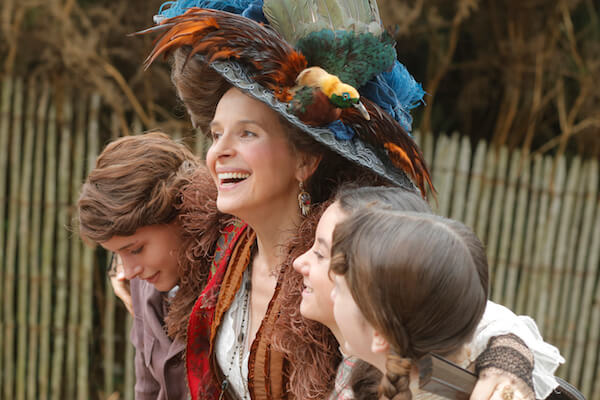David Dewaele. | NEW YORKER FILMS
BY STEVE ERICKSON | French director Bruno Dumont claims to be an atheist. All the same, his oeuvre testifies to the hold Christian iconography still has over the West. His first film was called “The Life of Jesus,” his latest “Hors [Outside] Satan.” His work mixes carnality and spiritual yearning; at times, he’s seemed equally influenced by pornography and the Bible. To some extent, the religious references in Dumont’s work may stem from the austere art film tradition he’s working from; he’s obviously inspired by Robert Bresson and Andrei Tarkovsky.
The strangest thing about “Hors Satan,” however, is the way it plays out on a moment-to-moment basis. It may have lofty concerns, but for most of its running time, it could be a documentary about two people walking around rural France. The film centers on a nameless man (David Dewaele) who lives in the dunes outside a small French town. (I’ll refer to the character by the actor’s name.) He befriends an equally nameless teenage girl (Alexandra Lematre) suffering under an abusive father. Eventually, he becomes such a part of her life that he takes extreme action against her father. He also becomes part of the lives of a group of women in the town, including a hitchhiker and a mother taking care of her sick daughter.
Dewaele and Lematre grow closer, spending most of their days walking around the dunes and marshes as he seems to perform miracles. The film suggests he’s the second coming of Jesus, but he’s capable of great violence. Is he instead a Satanic force, a possibility the film also leaves open?
Bruno Dumont conjures miracles amidst man’s brutality, nature’s splendor
“Hors Satan” alternates between extreme long shots and close-ups. The long shots often reduce people to tiny, wiggling images in a landscape. Nature is a vivid presence in the film, and the cinematography does a terrific job of capturing its beauty. It works in counterpoint to the ugliness of most of the human behavior Dumont depicts.
He likes to work with non-professional actors, though he’s made a film with Dewaele before, “Flanders,” in which the actor had a much smaller role. Dewaele’s face is gloomy and impassive. Dumont’s direction of actors seems influenced by Bresson, who emphasized gesture over more typical displays of feeling. I suspect Dumont was attracted to Dewaele because of his odd looks. The actor’s oval face resembles an image from a Picasso painting come to life. Dumont has always shied away from conventionally handsome actors as his male leads.
Made in 2011 and first shown at Cannes in May of that year, “Hors Satan” was rejected by the New York Film Festival and only received its New York premiere at the Museum of the Moving Image’s “First Look” series earlier this month. Dumont’s films have never had an easy time finding an audience. His second film, “Humanité,” caused one of the biggest controversies at Cannes in the past 20 years. Many critics mocked it and were startled and appalled when the festival’s jury, led by David Cronenberg, gave it several prizes. However, when the film was released in the US in 2000, the critical response was generally more appreciative.
I can think of one reason, however, why “Hors Satan” won’t go down easy in the US — or anywhere else. Dewaele’s character doesn’t seem to care about the line between consensual sex and rape, and in one case, his sexual assault is shown to have positive consequences for its victim. Though the film doesn’t present him as its unambiguous hero, neither does it pass judgment on his actions. Dumont has long been attracted to images of rape — “Hors Satan” is the third of his films in which it takes place, and it’s not likely to be a feminist favorite.
There are long stretches of “Hors Satan” where one can forget about such behavior — or spirituality, for that matter — and just take in its sights. For all the ugliness of its narrative, it offers a great deal of visual pleasure to compensate. The film is paced deliberately but carefully. In the end, the question of whether Dewaele is angelic, demonic, or something else entirely is left up to the spectator.
Religious references are rarely uttered by the characters; to a large degree, they’re imposed on the film by its title. “Hors Satan” is a film about finding moral bearings in a world where the old rules have gone awry, but it’s also an opportunity for some vicarious tourism in seductive scenery. In addition to Bresson and Tarkovsky, Dumont recalls the avant-garde tradition of meditative landscape films. Jesus or Satan, Dewaele walks through real splendor.
HORS SATAN | Directed by Bruno Dumont | In French with English subtitles | New Yorker Films | Opens Jan. 18 | Anthology Film Archives | 32 Second Ave. at Second St. | anthologyfilmarchives.org































